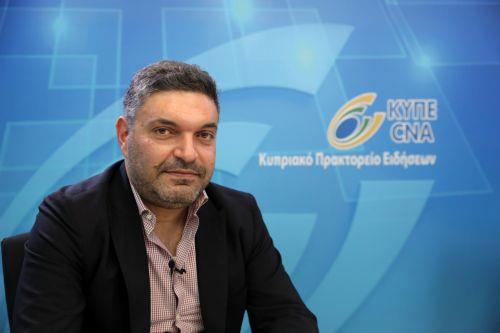The government clarified on Tuesday it will impose a special levy on suppliers and producers of electricity, but will tax them in a rational way that does not disincentivise the budding renewables industry in Cyprus.
In a statement, Finance Minister Constantinos Petrides also came down hard on main opposition Akel, panning them over their own proposals for taxing the windfall earnings of RES companies. He dismissed Akel’s proposals as ineffectual, amateurish and poorly thought out.
The minister said the government is currently drafting legislation which would impose a special levy on the turnover of electricity producers and suppliers, but at “a level that will not act as a disincentive for the further [market] penetration of renewables, ensuring the smooth functioning of the competitive electricity market and also the viability of investments in renewables.”
Akel have for weeks been calling for a tax on the ‘super-profits’ – windfall profits – of RES suppliers, the proceeds of which would go to providing relief to consumers hammered by rising energy costs.
Remarking that Akel and their presidential candidate Andreas Mavroyiannis have made this proposal their main point of attack during the election campaign, Petrides proceeded to trash their idea.
Akel have tabled two bills on the matter. Under the first, the state would tax the windfall earnings of RES suppliers. The tax would be determined based on the difference between the latest gross profit and the gross profit registered the previous year.
But it would not likewise apply to RES producers – a fact picked up on by Petrides, who said that as a result any tax revenues would be minimal.
Under Akel’s second bill, a special charge would be levied on future sales of electricity generated through renewables, the rate to be decided by the energy regulator. But Petrides pointed out that this would exclude any windfall earnings made so far since the outbreak of the energy inflation crisis.
“Taxing the windfall profits of RES suppliers, and imposing a charge on bilateral RES contracts… would generate very limited revenue. It is insulting to the intelligence of people to present these potential revenues as the solution for redistributing wealth,” Petrides observed.
Moreover, he said, Akel’s proposals ignore the fact that the government so far has allocated some €550 million in relief to electricity consumers – either directly by lowering taxes on fuel, subsidies, and energy-saving schemes.
“It is sad and superficial that these proposals [of Akel] are being adopted as the centerpiece of economic policy by the two main presidential candidates supported by opposition parties. Such ‘solutions’ are but a mockery of people.”
The economy czar stressed the government is committed to supporting the growth of renewables As such, haphazard attempts at taxation – as proposed by Akel – would only serve to introduce regulatory uncertainty and discourage investment.
Concluding, Petrides appeared to ridicule Akel and its candidate for failing to grasp the meaning of an EU regulation that sets a cap on the earnings of electricity producers. He pointed out that the regulation in question refers to producers and distributors of oil products, such as oil production, extraction and refining.
These activities do not take place in Cyprus, so it was odd that Akel were citing the EU regulation in pushing their proposals, he said.







Click here to change your cookie preferences